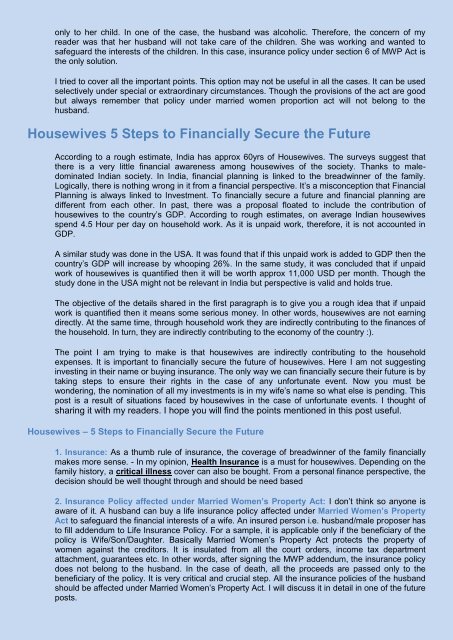Married Women Property Act-360 Degree Protection By.Pradeep Patil
We protect those things in people's lives that are precious beyond all calculation
We protect those things in people's lives that are precious beyond all calculation
Create successful ePaper yourself
Turn your PDF publications into a flip-book with our unique Google optimized e-Paper software.
only to her child. In one of the case, the husband was alcoholic. Therefore, the concern of my<br />
reader was that her husband will not take care of the children. She was working and wanted to<br />
safeguard the interests of the children. In this case, insurance policy under section 6 of MWP <strong>Act</strong> is<br />
the only solution.<br />
I tried to cover all the important points. This option may not be useful in all the cases. It can be used<br />
selectively under special or extraordinary circumstances. Though the provisions of the act are good<br />
but always remember that policy under married women proportion act will not belong to the<br />
husband.<br />
Housewives 5 Steps to Financially Secure the Future<br />
According to a rough estimate, India has approx 60yrs of Housewives. The surveys suggest that<br />
there is a very little financial awareness among housewives of the society. Thanks to maledominated<br />
Indian society. In India, financial planning is linked to the breadwinner of the family.<br />
Logically, there is nothing wrong in it from a financial perspective. It‘s a misconception that Financial<br />
Planning is always linked to Investment. To financially secure a future and financial planning are<br />
different from each other. In past, there was a proposal floated to include the contribution of<br />
housewives to the country‘s GDP. According to rough estimates, on average Indian housewives<br />
spend 4.5 Hour per day on household work. As it is unpaid work, therefore, it is not accounted in<br />
GDP.<br />
A similar study was done in the USA. It was found that if this unpaid work is added to GDP then the<br />
country‘s GDP will increase by whooping 26%. In the same study, it was concluded that if unpaid<br />
work of housewives is quantified then it will be worth approx 11,000 USD per month. Though the<br />
study done in the USA might not be relevant in India but perspective is valid and holds true.<br />
The objective of the details shared in the first paragraph is to give you a rough idea that if unpaid<br />
work is quantified then it means some serious money. In other words, housewives are not earning<br />
directly. At the same time, through household work they are indirectly contributing to the finances of<br />
the household. In turn, they are indirectly contributing to the economy of the country :).<br />
The point I am trying to make is that housewives are indirectly contributing to the household<br />
expenses. It is important to financially secure the future of housewives. Here I am not suggesting<br />
investing in their name or buying insurance. The only way we can financially secure their future is by<br />
taking steps to ensure their rights in the case of any unfortunate event. Now you must be<br />
wondering, the nomination of all my investments is in my wife‘s name so what else is pending. This<br />
post is a result of situations faced by housewives in the case of unfortunate events. I thought of<br />
sharing it with my readers. I hope you will find the points mentioned in this post useful.<br />
Housewives – 5 Steps to Financially Secure the Future<br />
1. Insurance: As a thumb rule of insurance, the coverage of breadwinner of the family financially<br />
makes more sense. - In my opinion, Health Insurance is a must for housewives. Depending on the<br />
family history, a critical illness cover can also be bought. From a personal finance perspective, the<br />
decision should be well thought through and should be need based<br />
2. Insurance Policy affected under <strong>Married</strong> <strong>Women</strong>’s <strong>Property</strong> <strong>Act</strong>: I don‘t think so anyone is<br />
aware of it. A husband can buy a life insurance policy affected under <strong>Married</strong> <strong>Women</strong>’s <strong>Property</strong><br />
<strong>Act</strong> to safeguard the financial interests of a wife. An insured person i.e. husband/male proposer has<br />
to fill addendum to Life Insurance Policy. For a sample, it is applicable only if the beneficiary of the<br />
policy is Wife/Son/Daughter. Basically <strong>Married</strong> <strong>Women</strong>‘s <strong>Property</strong> <strong>Act</strong> protects the property of<br />
women against the creditors. It is insulated from all the court orders, income tax department<br />
attachment, guarantees etc. In other words, after signing the MWP addendum, the insurance policy<br />
does not belong to the husband. In the case of death, all the proceeds are passed only to the<br />
beneficiary of the policy. It is very critical and crucial step. All the insurance policies of the husband<br />
should be affected under <strong>Married</strong> <strong>Women</strong>‘s <strong>Property</strong> <strong>Act</strong>. I will discuss it in detail in one of the future<br />
posts.


















